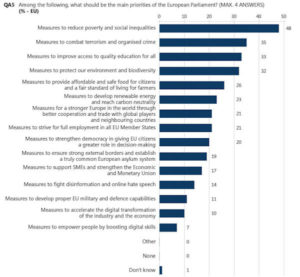European citizens view the EU as the right framework to act, but want it to be improved.
This is one the main findings of a wide-ranging opinion poll carried out in all EU member states by the market research company Kantar on behalf of the European Parliament. The data was collected in November and December 2020, i.e. before the debate about the shortage of Covid-19 vaccines erupted in several EU member states.
Economic pessimism
According to the “Parlemeter 2020” survey released today, the number of citizens who are positive about the EU has increased by ten percentage points compared to the autumn of 2020. Two-thirds of respondents were optimistic about the future of the EU.

Screenshot: Parlemeter 2020 / European Parliament
Nevertheless, the individual outlook of respondents remains pessimistic due to the ongoing pandemic: 53 percent of respondents expressed their belief that the economic situation in their home country would be worse in a year than it is at present. Only one in five respondents said that the national economic situation would improve in the coming year while around half expect their living conditions to be the same in a year from now. A quarter think they will even be worse off in a year’s time.
Top priority: Fighting poverty and inequality
These different impacts may also have prompted the call for a new top political priority among citizens, the survey found: almost one in two participants queried would like to see the fight against poverty and social inequality become the main priority of the European Parliament. This consistently topped the list in all EU member states except the Czech Republic and the three Scandinavian countries, where the fight against terrorism and crime came first.
On average, the fight against terrorism came second as priority (35 percent), followed by good education for all (33 percent) and protecting the environment (32 percent).
Defending human rights
A similar trend can be seen in the ranking given by citizens of fundamental values that the European Parliament should defend. While the defence of human rights world-wide (51 percent) and securing equal rights for men and women (42 percent) remain top of the list, solidarity between member states comes in a close third (41 percent, compared to 33 percent a year ago).
The pandemic and other global challenges such as the climate crisis have apparently increased citizens’ appetite for a fundamental reform of the EU. Almost two-thirds (63 percent) of respondents wanted the European Parliament to play a more important role in the future.
Three quarters of citizens want EU reform
This is an increase of 5 percentage points compared to the autumn of 2019. And while the positive image of the EU has increased, so has the call for change: Only around a quarter of respondents (27 percent EU-wide) appreciate the EU in its current shape and form, while a plurality (44 percent) said they “tend to support” the EU but demand reform. Around a fifth expressed scepticism of the European Union, but said they might change their mind in case of radical reform.






